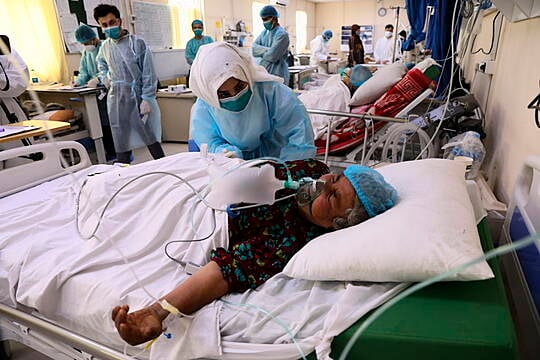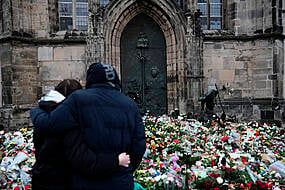Afghanistan is battling a brutal surge in Covid-19 infections after health officials were told by the World Health Organisation (WHO) that the three million doses the country expected to receive by April will not be delivered until August.
Health ministry spokesman Ghulam Dastigir Nazari said the country is in the middle of a crisis, and expressed deep frustration at the global vaccine distribution that has left poor countries scrambling to find supplies for their people.
Mr Nazari said he has knocked on the door of several embassies, but so far, he has received “diplomatic answers” – but no vaccine doses.

Over the past month, the escalating pace of new cases has threatened to overwhelm Afghanistan’s health system, already struggling under the weight of relentless conflict.
In part, the increase has been blamed on uninterrupted travel with India, bringing the highly contagious Delta variant, first identified in India.
Also, most Afghans still question the reality of the virus or believe their faith will protect them, and rarely wear masks or practise social distancing – often mocking those who do.
Until just a week ago, the government was allowing unrestricted mass gatherings.
The Delta variant has helped send Afghanistan’s infection rate soaring, hitting 16 provinces and the capital Kabul the hardest.

This week, the rate of registered new cases reached as high as 1,500 a day, compared to 178 a day on May 1.
Hospital beds are full, and it is feared rapidly dwindling oxygen supplies will run out.
Afghan ambassadors have been ordered to seek out emergency oxygen supplies in nearby countries, foreign minister Haneef Atmar said in a tweet on Friday.
By official figures, Afghanistan has seen a total 78,000 cases and 3,007 deaths from the pandemic. But those figures are likely to be a massive undercount, registering only deaths in hospitals, not the far greater numbers who die at home.
Testing is woefully inadequate. In only the past month, the percentage of positive Covid tests has jumped from about 8% to 60% in some parts of the country. By WHO recommendations, anything higher than 5% shows officials are not testing widely enough, allowing the virus to spread unchecked.
At most, only 3,000 tests a day are carried out, as Afghans resist testing, even after the country dramatically ramped up its capabilities to 25,000 a day.
Only recently, the government tried to take steps to clamp down to contain the surge. It closed schools, universities and colleges for two weeks. It also shut down wedding halls, which had been operating unhindered throughout the pandemic.

But it is rare to see anyone wearing a mask in the streets, and even where masks are mandatory, like in government offices, it is rarely enforced. As many as 10 flights arrive daily from India, packed with Afghans, particularly students and people who had gone to India for medical treatment.
Mr Nazari said banning flights was not an option since many Afghans cannot afford to be stranded in India and the government cannot prevent citizens from re-entering their own country.
For vaccines, Afghanistan so far has relied on a donation of AstraZeneca doses from India and purchases of Sinopharm from China. Roughly 600,000 people have had at least one dose – about 1.6% of the population of 36 million.
But the number who have gotten a second dose is minute — “so few I couldn’t even say any percentage”, Mr Nazari said.
"A sufficient consensus on the role and functions of WHO will be among the first steps for moving towards the theory and practice for health as a public good."
-#Afghanistan🇦🇫 President @ashrafghani at #WHA74 pic.twitter.com/aYcKNdpA5q— World Health Organization (WHO) (@WHO) June 4, 2021
Last month, the ministry received a letter from WHO saying the expected shipment of three million vaccine doses will not arrive until August due to supply problems, Mr Nazari said.
With just 35,000 vaccine doses remaining in the country, the authorities were forced to stop giving first jabs to use remaining supplies to give second jabs, he said.
Poor countries around the world have been pleading for vaccines even as developed nations have been able to inoculate significant portions of their populations. Covax, set up with UN help to try to prevent vaccine inequities, has struggled to fill the gap.
It faced a major setback when its biggest supplier, the Serum Institute of India, announced last month that it would not export any vaccines until the end of the year because of the surge in that country.
“Honestly speaking, I lost my faith in Covax,” Mr Nazari said.
“Unfortunately, there are countries who vaccinated more than their 50% or 60% percent of the population … and there are countries who did not receive vaccines to even vaccinate 1% of their population.”







